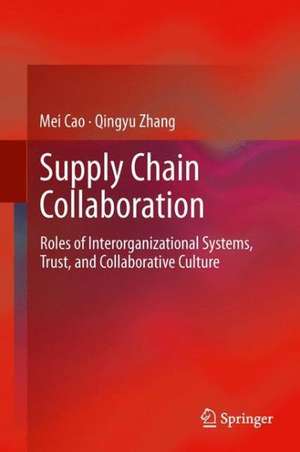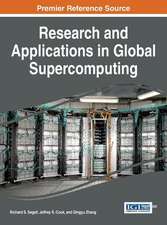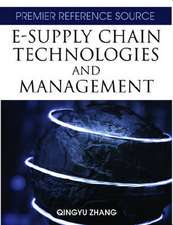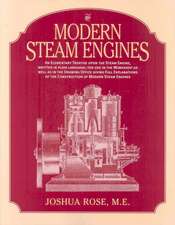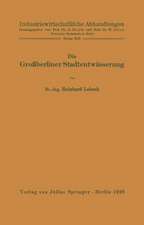Supply Chain Collaboration: Roles of Interorganizational Systems, Trust, and Collaborative Culture
Autor Mei Cao, Qingyu Zhangen Limba Engleză Paperback – 9 noi 2014
Supply Chain Collaboration: Roles of Interorganizational Systems, Trust, and Collaborative Culture conceptualizes supply chain collaboration as seven interconnecting elements including information sharing, incentive alignment, goal congruence, decision synchronization, resource sharing, as well as communication and joint knowledge creation. These seven components define the occurrence of collaborative efforts and allow us to explain supply chain collaboration more precisely. Collaborative advantages are also divided into five components to capture the joint competitive advantages and benefits among supply chain partners.
The definitions and measures developed here examine some central issue surrounding supply chain development but this is also followed up with real-life managerial practicalities. This balance of theory and practical application makes Supply Chain Collaboration: Roles of Interorganizational Systems, Trust, and Collaborative Culture a strong resource for industry practitioners and researchers alike.
| Toate formatele și edițiile | Preț | Express |
|---|---|---|
| Paperback (1) | 636.30 lei 6-8 săpt. | |
| SPRINGER LONDON – 9 noi 2014 | 636.30 lei 6-8 săpt. | |
| Hardback (1) | 640.06 lei 6-8 săpt. | |
| SPRINGER LONDON – 5 oct 2012 | 640.06 lei 6-8 săpt. |
Preț: 636.30 lei
Preț vechi: 748.59 lei
-15% Nou
Puncte Express: 954
Preț estimativ în valută:
121.79€ • 132.34$ • 102.37£
121.79€ • 132.34$ • 102.37£
Carte tipărită la comandă
Livrare economică 21 aprilie-05 mai
Preluare comenzi: 021 569.72.76
Specificații
ISBN-13: 9781447162155
ISBN-10: 1447162153
Pagini: 212
Ilustrații: XIV, 198 p.
Dimensiuni: 155 x 235 x 11 mm
Greutate: 0.3 kg
Ediția:2013
Editura: SPRINGER LONDON
Colecția Springer
Locul publicării:London, United Kingdom
ISBN-10: 1447162153
Pagini: 212
Ilustrații: XIV, 198 p.
Dimensiuni: 155 x 235 x 11 mm
Greutate: 0.3 kg
Ediția:2013
Editura: SPRINGER LONDON
Colecția Springer
Locul publicării:London, United Kingdom
Public țintă
ResearchCuprins
Preface.- Acknowledgements.- 1.Introduction.- 2.Theory and Theoretical Framework.- 3.Antecedents of Supply Chain Collaboration.- 4.Supply Chain Collaboration Characterization.- 5.Collaborative Advantage As Consequences.- 6.Structured Interview and Q-Sort.- 7.Large-Scale Analysis and Testing.- 8Research and Managerial Insights.- Appendix: Measurement Items, Criteria, and Questionnaire
Notă biografică
Dr. Mei Cao is an associate professor at the University of Wisconsin-Superior. She is certified in Transportation and Logistics (CTL) by AST&L. She has publications in various academic journals such as the Journal of Operations Management, the European Journal of Operational Research, the International Journal of Production Research, the International Journal of Production Economics, the International Journal of Operations and Production Management, the Journal of Systems Science and Systems Engineering, Information & Management, Industrial Management & Data Systems, the International Journal of Product Development, and the International Journal of Services Technology and Management. She serves on the editorial boards of the International Journal of Operations Research and Information Systems, and the International Journal of Information Technology Project Management. Her research interests include supply chain management, transportation and logistics, flexibility, and inter-organizational information systems. Her research has been funded by the National Center for Freight and Infrastructure Research and Education under the sponsorship of the U.S. Department of Transportation.
Dr. Qingyu Zhang is an associate professor at Arkansas State University. He is an APICS Certified Fellow in Production and Inventory Management. He is also certified MCSD, MCSE, and MCDBA by Microsoft. He has published in the European Journal of Operational Research, the International Journal of Production Research, the Journal of Operations Management, the International Journal of Production Economics, the International Journal of Operations and Production Management, the International Journal of Logistics Management, the Journal of Systems Science and Systems Engineering, Kybernetes: International Journal of Systems and Cybernetics, Industrial Management & Data Systems, the International Journal of Product Development, the International Journal of Quality andReliability Management, the European Journal of Innovation Management, and the International Journal of Information Technology and Decision Making. Dr. Zhang’s research interests are supply chain management, value chain flexibility, e-commerce, product development, and data mining. He serves on the editorial boards of the Journal of Computer Information Systems, the Information Resource Management Journal, the International Journal of Integrated Supply Management, the International Journal of Data Analysis Techniques and Strategy, and the International Journal of Information Technology Project Management.
.
Dr. Qingyu Zhang is an associate professor at Arkansas State University. He is an APICS Certified Fellow in Production and Inventory Management. He is also certified MCSD, MCSE, and MCDBA by Microsoft. He has published in the European Journal of Operational Research, the International Journal of Production Research, the Journal of Operations Management, the International Journal of Production Economics, the International Journal of Operations and Production Management, the International Journal of Logistics Management, the Journal of Systems Science and Systems Engineering, Kybernetes: International Journal of Systems and Cybernetics, Industrial Management & Data Systems, the International Journal of Product Development, the International Journal of Quality andReliability Management, the European Journal of Innovation Management, and the International Journal of Information Technology and Decision Making. Dr. Zhang’s research interests are supply chain management, value chain flexibility, e-commerce, product development, and data mining. He serves on the editorial boards of the Journal of Computer Information Systems, the Information Resource Management Journal, the International Journal of Integrated Supply Management, the International Journal of Data Analysis Techniques and Strategy, and the International Journal of Information Technology Project Management.
.
Textul de pe ultima copertă
To survive and thrive in the competition, firms have strived to achieve greater supply chain collaboration to leverage the resources and knowledge of suppliers and customers. Internet based technologies, particularly interorganizational systems, further extend the firms’ opportunities to strengthen their supply chain partnerships and share real-time information to optimize their operations. Supply Chain Collaboration: Roles of Interorganizational Systems, Trust, and Collaborative Culture explores the nature and characteristics, antecedents, and consequences of supply chain collaboration from multiple theoretical perspectives.
Supply Chain Collaboration: Roles of Interorganizational Systems, Trust, and Collaborative Culture conceptualizes supply chain collaboration as seven interconnecting elements including information sharing, incentive alignment, goal congruence, decision synchronization, resource sharing, as well as communication and joint knowledge creation. These seven components define the occurrence of collaborative efforts and allow us to explain supply chain collaboration more precisely. Collaborative advantages are also divided into five components to capture the joint competitive advantages and benefits among supply chain partners.
The definitions and measures developed here examine some central issue surrounding supply chain development but this is also followed up with real-life managerial practicalities. This balance of theory and practical application makes Supply Chain Collaboration: Roles of Interorganizational Systems, Trust, and Collaborative Culture a strong resource for industry practitioners and researchers alike.
Supply Chain Collaboration: Roles of Interorganizational Systems, Trust, and Collaborative Culture conceptualizes supply chain collaboration as seven interconnecting elements including information sharing, incentive alignment, goal congruence, decision synchronization, resource sharing, as well as communication and joint knowledge creation. These seven components define the occurrence of collaborative efforts and allow us to explain supply chain collaboration more precisely. Collaborative advantages are also divided into five components to capture the joint competitive advantages and benefits among supply chain partners.
The definitions and measures developed here examine some central issue surrounding supply chain development but this is also followed up with real-life managerial practicalities. This balance of theory and practical application makes Supply Chain Collaboration: Roles of Interorganizational Systems, Trust, and Collaborative Culture a strong resource for industry practitioners and researchers alike.
Caracteristici
Provides an accurate and comprehensive conceptualization of supply chain collaboration Develops valid and reliable instruments of supply chain collaboration, collaborative advantages, and their related constructs Brings together an extensive set of factors from multiple perspectives, the research to extend understanding of the attributes of supply chain collaboration, the forces leading to the development of supply chain partnership, and issues involved in creating and managing the partnership Includes supplementary material: sn.pub/extras
